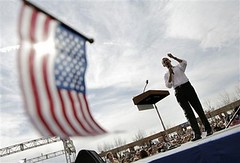2.20.07: Will Obama win the Net vote?
Writing in The Washington Post, EJ Dionne gives Barack Obama good odds to win over the Internet in the Democratic primary. Since the Internet has gone mainstream in politics, though, Hilary Clinton is sure to put up a good fight. While the Clinton-run Democratic establishment scoffed at MoveOn and the Web in '04, Howard Dean's DNC definitely gets it - and so does John McCain.
"It's so mainstream now that every part of the campaign touches the Internet," said Becki Donatelli, who pioneered McCain's 2000 Internet fundraising and is working for him again. "It's the 900-pound gorilla. It's the real thing.""It's hard to have a Dean-like phenomenon ever again," said Simon Rosenberg, president of NDN, formerly the New Democrat Network, a progressive advocacy group, "because the Internet is not a shiny new toy anymore."
 Obama's campaign uses the words blogosphere likes to hear - participatory, "your" campaign, etc - and he winning among the young. But young voters have not shown up in their full numbers yet. To be truly mainstream is to reach people who don't necessarily want to create their own blogs on BarackObama.com but still want to feel part of the campaign.
Obama's campaign uses the words blogosphere likes to hear - participatory, "your" campaign, etc - and he winning among the young. But young voters have not shown up in their full numbers yet. To be truly mainstream is to reach people who don't necessarily want to create their own blogs on BarackObama.com but still want to feel part of the campaign.
"You have to make people feel they're part of the campaign," MoveOn.org's Barack Obama says, "that they're not just people a candidate is trying to suck money out of."
It will be harder for Clinton to make that claim since she's been widely hailed as a fund-raising machine and, Trippi says, people will conclude Clinton "doesn't need the money." Still, if it's an important campaign too, Hilary will be "competitive," NDN's Rosenberg says.
This year will also see a shift to marketing-based net fundraising, as opposed to the activist-based funding four years ago.
"In 2000, nearly 90 percent of what we took in on our Web site came from people who found their way to us," Donatelli said, referring to McCain's effort. Now, 50 percent of Internet money is raised through "direct marketing."
If the Internet really delivers big donations, it could once and for all completely change the political landscape, says Dionne.
In the coming months, partly because it's fun to do, the political world will be watching Hollywood and Wall Street to see who racks up the big money. But 2008 promises to be the year when decisions made at millions of computer screens on kitchen tables and office desks could outshine the glitz and beat out the large checkbooks. The Internet could thus provide Obama his best chance of keeping up with one of the most formidable fundraisers in Democratic politics.


